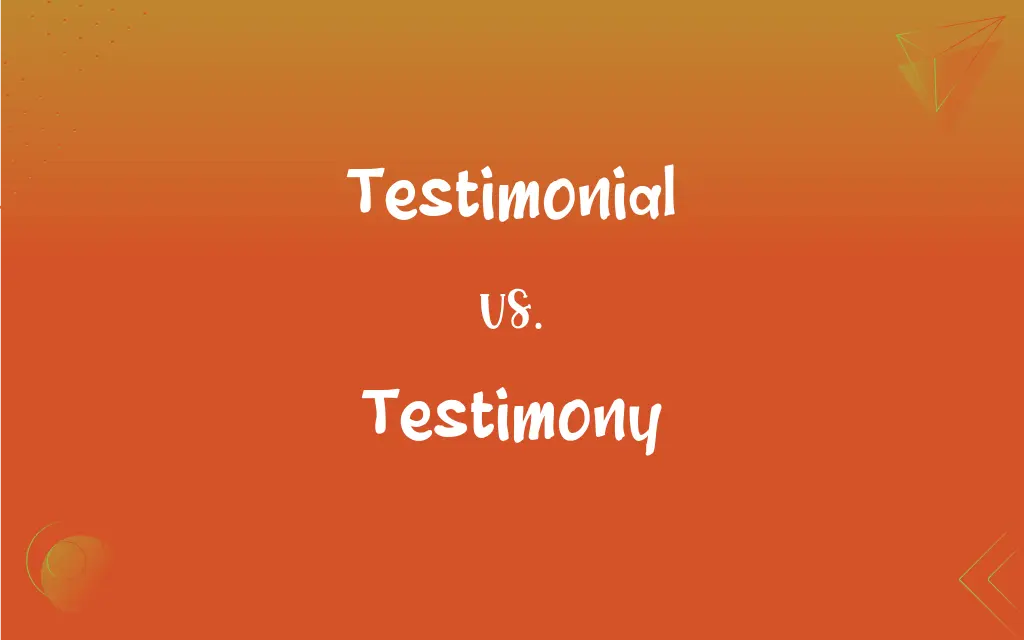Testimonial vs. Testimony: What's the Difference?
Edited by Aimie Carlson || By Janet White || Updated on October 7, 2023
A testimonial is a formal statement testifying to someone's character or qualifications, while testimony is a formal statement or evidence given in a court of law or religious context.

Key Differences
A testimonial often refers to a written or spoken recommendation or endorsement. Organizations or individuals might use it to promote a product, service, or even a person's capabilities. In contrast, a testimony is more formal and often occurs within a legal or religious context, where someone provides a firsthand account of events they witnessed. Testimonials are commonly found in advertising, where satisfied customers share positive experiences to convince potential customers of the product or service's worth. Conversely, testimony is given under oath, with the person testifying expected to tell the truth, whether in a court or in religious settings recounting a personal experience. While both testimonial and testimony are based on personal experiences, the context and intent can differ significantly. A testimonial might be used to build trust, while a testimony can be critical evidence in reaching a verdict or convincing others of a spiritual experience. Testimonials can be found on websites, brochures, and even in personal portfolios, showcasing positive feedback or endorsements. Testimonies, however, have gravitas. In courts, false testimony can lead to perjury charges, while in religious contexts, it's about sharing profound personal experiences. In essence, while both testimonial and testimony are forms of attesting or bearing witness to something, their applications and implications are different. A testimonial serves more of a promotional or affirming purpose, whereas a testimony is about presenting evidence or sharing deep personal beliefs.
Comparison Chart
Primary Use
Endorsement or recommendation
Formal statement in a legal or religious context
Context
Advertising, promotion, or validation
Courts of law, religious gatherings
Based On
Personal experience or opinion
Witnessed events or personal spiritual experiences
Consequences of False Statements
May harm reputation or trust
Legal consequences (e.g., perjury) or challenges to authenticity
ADVERTISEMENT
Intent
Convince, promote, or affirm
Provide evidence or share profound experiences
Testimonial and Testimony Definitions
Testimonial
A written affirmation of a person's character or qualifications.
Her previous employer provided a testimonial praising her work ethic.
Testimony
A formal written or spoken statement in a court of law.
His testimony was crucial in securing a conviction.
Testimonial
A statement vouching for a product or service's quality.
The weight loss product has glowing testimonials from satisfied customers.
Testimony
A public recounting of a religious conversion or experience.
She shared her testimony about finding faith during tough times.
ADVERTISEMENT
Testimonial
A tribute given for services or achievements.
He received a testimonial match for his contribution to the sport.
Testimony
Evidence or proof provided by the existence or appearance of something.
The thriving forest stands as testimony to the success of the conservation efforts.
Testimonial
Public acknowledgment or appreciation.
The actor's fans filled the website with testimonials about his performances.
Testimony
A personal account or anecdote.
The survivor's testimony shed light on the hardships they faced.
Testimonial
A token of admiration or gratitude.
The community gave her a testimonial in recognition of her charity work.
Testimony
A declaration by a witness under oath.
She gave her testimony before the jury.
Testimonial
A statement in support of a particular truth, fact, or claim.
Testimony
A declaration by a witness under oath, as that given before a court or deliberative body.
Testimonial
A written affirmation of another's character or worth; a personal recommendation.
Testimony
All such declarations, spoken or written, offered in a legal case or deliberative hearing.
Testimonial
Something given in appreciation of a person's service or achievement; a tribute.
Testimony
Evidence in support of a fact or assertion; proof.
Testimonial
Relating to or constituting a testimony or testimonial
Testimonial statements.
A testimonial dinner.
Testimony
A public declaration regarding a religious experience.
Testimonial
A statement, especially one given under oath; testimony
Testimony
In the Bible, the stone tablets inscribed with the Ten Commandments.
Testimonial
A written recommendation of someone's worth or character
Testimony
The ark containing these tablets.
Testimonial
A tribute given in appreciation of someone's service etc.
Testimony
(legal) Statements made by a witness in court.
Testimonial
(football) A match played in tribute to a particular player (who sometimes receives a proportion of the gate money).
Testimony
An account of first-hand experience.
Testimonial
Serving as testimony.
A testimonial statement
Testimony
(religion) In a church service (or religious service), a personal account, such as one's conversion, testimony of faith, or life testimony.
Testimonial
A writing or certificate which bears testimony in favor of one's character, good conduct, ability, etc., or of the value of a thing.
Testimony
Witness; evidence; proof of some fact.
Testimonial
Something, as money or plate, presented to a preson as a token of respect, or of obligation for services rendered.
Testimony
A solemn declaration or affirmation made for the purpose of establishing or proving some fact.
Testimonial
Relating to, or containing, testimony.
Testimony
Affirmation; declaration; as, these doctrines are supported by the uniform testimony of the fathers; the belief of past facts must depend on the evidence of human testimony, or the testimony of historians.
Testimonial
Something that serves as evidence;
His effort was testimony to his devotion
Testimony
Open attestation; profession.
[Thou] for the testimony of truth, hast borneUniversal reproach.
Testimonial
Something given or done as an expression of esteem
Testimony
Witness; evidence; proof of some fact.
When ye depart thence, shake off the dust under your feet for a testimony against them.
Testimonial
Something that recommends (or expresses commendation) of a person or thing as worthy or desirable
Testimony
The two tables of the law.
Thou shalt put into the ark the testimony which I shall give thee.
Testimonial
Expressing admiration or appreciation;
Testimonial dinner
Testimony
Hence, the whole divine revelation; the sacre Scriptures.
The testimony of the Lord is sure, making wise the simple.
Testimonial
Of or relating to or constituting testimony
Testimony
To witness; to attest; to prove by testimony.
Testimony
A solemn statement made under oath
Testimony
An assertion offering firsthand authentication of a fact;
According to his own testimony he can't do it
Testimony
Something that serves as evidence;
His effort was testimony to his devotion
FAQs
What's the main goal of a testimonial?
A testimonial aims to endorse, promote, or validate a product, service, or individual's capabilities.
Where might I find testimonials for a product?
Testimonials are often found on product websites, review sites, or promotional materials.
Can a testimonial be negative?
Typically, testimonials are positive endorsements, but they can be negative if highlighting issues or concerns.
Is testimony always truthful?
While testimony should be truthful, especially under oath in legal contexts, instances of false or misleading testimonies do occur.
How can I verify the authenticity of a testimonial?
Authenticity of a testimonial can be verified by checking the source or contacting the person who gave it.
How do businesses collect testimonials?
Businesses may request testimonials through feedback forms, emails, or after service surveys.
What's the religious context of testimony?
In religion, a testimony refers to a believer's personal account of spiritual experiences or conversions.
Can I use testimonials in my personal portfolio?
Yes, testimonials from satisfied clients or colleagues can enhance a personal portfolio.
Is testimony always given in court?
No, while testimony is often associated with legal contexts, it can also refer to personal accounts in religious settings.
Can false testimony lead to legal consequences?
Yes, providing false testimony, especially under oath, can lead to charges of perjury.
Are video testimonials effective?
Video testimonials can be persuasive as they provide visual and emotional elements.
Can a testimonial help boost sales?
A genuine and relatable testimonial can enhance trust and potentially boost sales.
Is testimony limited to firsthand experiences?
While testimony typically involves firsthand accounts, it can also include things one has heard, known as hearsay, though its admissibility varies.
What is expert testimony?
Expert testimony is given by a specialist in a particular field, offering insights based on their expertise.
Can testimony be given outside of legal or religious contexts?
Yes, testimony can broadly refer to any personal account or narrative, though it's most commonly linked to legal or religious settings.
Is a LinkedIn recommendation considered a testimonial?
Yes, a LinkedIn recommendation acts as a testimonial for an individual's professional skills.
How important is a witness's testimony in court proceedings?
A witness's testimony can be pivotal in influencing the verdict in court proceedings.
Can testimony be written or is it always spoken?
Testimony can be both written (affidavit) or spoken (oral testimony).
Can I use celebrity testimonials for my product?
Yes, but ensure you have the necessary permissions and that the testimonial is genuine.
How can testimony affect a jury's decision?
A compelling testimony can significantly influence a jury's perception of facts and their final decision.
About Author
Written by
Janet WhiteJanet White has been an esteemed writer and blogger for Difference Wiki. Holding a Master's degree in Science and Medical Journalism from the prestigious Boston University, she has consistently demonstrated her expertise and passion for her field. When she's not immersed in her work, Janet relishes her time exercising, delving into a good book, and cherishing moments with friends and family.
Edited by
Aimie CarlsonAimie Carlson, holding a master's degree in English literature, is a fervent English language enthusiast. She lends her writing talents to Difference Wiki, a prominent website that specializes in comparisons, offering readers insightful analyses that both captivate and inform.







































































